Introduction: “The Daddio of the Raddio” At the USA Radio Museum, we celebrate the voices who didn’t just play music—they changed the way America l
Introduction: “The Daddio of the Raddio”
At the USA Radio Museum, we celebrate the voices who didn’t just play music—they changed the way America listened to the radio. These are the pioneers who broke barriers, built bridges, and gave sound to stories that might otherwise have gone unheard. Among them stands a figure whose name may not grace every textbook, but whose fingerprints are all over the fabric of American radio: Porky Chedwick.
 Craig “Porky” Chedwick wasn’t just a disc jockey—he was a cultural catalyst. Long before the term “rock and roll” entered the mainstream, before oldies radio had a name, before racial integration reached the airwaves, Porky was already spinning rhythm and blues, gospel, and jazz by Black artists in broad daylight. He didn’t follow trends. He created them. He didn’t chase fame. He chased feeling.
Craig “Porky” Chedwick wasn’t just a disc jockey—he was a cultural catalyst. Long before the term “rock and roll” entered the mainstream, before oldies radio had a name, before racial integration reached the airwaves, Porky was already spinning rhythm and blues, gospel, and jazz by Black artists in broad daylight. He didn’t follow trends. He created them. He didn’t chase fame. He chased feeling.
Born in 1918 in Homestead, Pennsylvania, Porky grew up in a working-class neighborhood where poverty blurred racial lines and music offered refuge. His love for “dusty discs”—forgotten 78s buried in bargain bins—became the heartbeat of his sound. And from a tiny studio behind a candy store, he built a movement that would ripple across generations.
He was the first white DJ on the East Coast to exclusively play Black music. He coined the term “dusty discs.” He inspired record hops, traffic jams, and stadium sellouts. He mentored future legends, gave voice to the voiceless, and made Pittsburgh groove.
This tribute presentation is more than a biography. It’s a reclamation. A celebration. A long-overdue recognition of a man who helped birth soul radio, shaped the oldies format, and proved that music—real music—knows no barriers nor color.
This is the story of Porky Chedwick: radio rebel, cultural connector, and the forgotten, but yet inspiring, father of oldies radio. — USA RADIO MUSEUM
_____________________
Origins: From Homestead to History
Craig “Porky” Chedwick was born on February 4, 1918, in Homestead, Pennsylvania, a gritty, working-class suburb nestled along the Monongahela River just outside Pittsburgh. The second of ten children in a bustling household, Porky grew up in a neighborhood where hardship was shared and community was sacred. Homestead wasn’t just diverse—it was integrated in spirit, if not by design. Black and white families lived side by side, bound together by economic struggle and the rhythms of daily life.
In this environment, music wasn’t a luxury—it was lifeblood. Gospel spilled from church windows, blues hummed from porches, and rhythm and soul echoed through alleyways and corner stores. Porky absorbed it all. He didn’t see color—he saw character. He didn’t hear genre—he heard truth. That early exposure to Black music, not as an outsider but as a neighbor, shaped his worldview and later, his playlist. For Porky, skin color didn’t matter. Soul did.
As a young man, Porky found his voice in the world of sports journalism, working as a stringer for the Homestead Daily Messenger, covering local athletic events with passion and precision. He also served as a public address announcer, captivating crowds with his booming delivery and natural charisma. Though he never attended college, Porky was a student of the streets—sharp, observant, and deeply attuned to the emotional power of sound.
He was self-taught, self-made, and self-propelled. His education came from record store booths, jukeboxes, and the lived experiences of the people around him. He developed an uncanny ability to read a room, feel a groove, and connect with listeners—not through polish, but through empathy and instinct. Porky didn’t just play music. He translated it. He made it matter.
These early years in Homestead weren’t just a backdrop—they were the blueprint. They gave Porky his purpose, his pulse, and his profound belief that music could bridge divides, heal wounds, and move mountains. Before he ever touched a turntable, Porky Chedwick was already tuned in to the rhythm of humanity.
WHOD and the Rise of the Dusty Disc
On August 1, 1948, a seismic shift quietly began in Pittsburgh radio. Craig “Porky” Chedwick made his debut on WHOD AM 860, hosting a modest 20-minute segment that blended sports commentary with music. But it wasn’t long before the music took over—and history followed.
What started as filler soon became a phenomenon. Porky’s ear was unlike any other. He gravitated toward the forgotten 78s buried in bargain bins—records by Black artists that had never seen airplay, relegated to jukeboxes and backroom shelves. He called them “dusty discs,” and he spun them with reverence, not novelty. Gospel, rhythm and blues, jazz—sounds that stirred the soul and moved the feet. Porky didn’t just play them; he preached them.
His show evolved into the “Masterful Rhythm, Blues and Jazz Show,” eventually expanding to a five-hour daily broadcast known simply as The Porky Chedwick Show. It became a lifeline for listeners hungry for authenticity, groove, and emotional truth. His playlist wasn’t just a collection—it was Pittsburgh’s pulse, often drawing more listeners than even KDKA’s news coverage or Pirates baseball games.
Porky’s microphone became a megaphone for the marginalized. He didn’t ask permission—he gave the music a platform. And in doing so, he laid the foundation for soul radio, broke racial barriers, and created a cultural movement that would ripple far beyond the Steel City.
This was the birth of the Dusty Disc era. And it all began at WHOD.
Music Without Borders
Porky Chedwick’s musical mission was born not in a studio, but in the streets of Homestead, Pennsylvania—a working-class neighborhood where poverty blurred racial lines and music became the common language. In a community stitched together by struggle, sound was the glue. Gospel cries echoed from church windows, blues moans drifted from porches, and rhythm lived in every heartbeat. Porky absorbed it all.
He didn’t play what labels pushed. He played what moved people. B-sides, gospel laments, jump blues, and raw emotion—songs that spoke to the soul, not the charts. His selections weren’t curated by industry trends; they were chosen by feel, by truth, by the ache and joy they carried. Porky’s playlist was a mirror to the lived experience of his listeners, especially those whose voices had long been ignored.
This fearless devotion to authenticity helped launch the careers of artists who would go on to shape American music. Bo Diddley, The Drifters, The Skyliners, and Smokey Robinson all credited Porky with giving their records a chance when no one else would. He didn’t wait for permission—he gave them airplay, and in doing so, gave them momentum.
Even decades later, his influence rippled. Promoter Richard Nader, architect of the 1970s oldies revival, cited Porky as a direct inspiration. The very idea of celebrating forgotten hits and honoring musical roots was something Porky had been doing since the 1940s—long before nostalgia became a movement.
Porky’s radio wasn’t formatted. It was felt. And in that feeling, he built bridges—between Black and white, past and present, artist and audience. His music had no borders. Only rhythm. Pure soul.
WAMO, Elvis, and the Power of Principle
In 1956, WHOD underwent a dramatic transformation, rebranding itself as WAMO and shifting to a country music format. But one voice remained untouched by the change—Porky Chedwick. While the rest of the station leaned into twang and steel guitars, Porky held firm to his rhythm and blues roots. His show was the exception to the rule, a soulful outpost in a sea of conformity.
That same year, a pivotal moment tested Porky’s principles. Colonel Tom Parker, the infamous manager of Elvis Presley, personally pitched Porky on spinning Elvis’s version of “Hound Dog.” But Porky declined. He had already championed the original—Big Mama Thornton’s raw, thunderous recording—and he wasn’t about to replace it with a sanitized cover. Porky believed in honoring the source, not the sensation. His loyalty wasn’t to fame—it was to truth.
By 1958, WAMO had pivoted again, this time embracing an all-R&B format with an all-Black staff. Yet Porky remained, the lone white voice in a station now fully dedicated to the music he had long championed. And he wasn’t just tolerated—he was revered. His presence wasn’t an anomaly; it was a testament to his authenticity. Porky had earned his place not through tokenism, but through decades of devotion, respect, and cultural fluency.
He wasn’t just part of WAMO’s evolution—he was its soul. The station may have changed formats, staff, and ownership, but Porky remained the heartbeat, spinning dusty discs with reverence and refusing to compromise his values. In an industry often driven by trends and payola, Porky stood as a beacon of principle.
This was more than radio. It was a quiet revolution. And Porky was its unwavering voice.
A DJ with a Mission
Porky Chedwick wasn’t just spinning records—he was spinning values. Beneath the rhythm and blues, behind the microphone, lived a man deeply committed to a Christian lifestyle rooted in discipline, compassion, and integrity. He openly promoted a life free of alcohol, tobacco, and drugs, not as a sermon, but as a standard. His broadcasts carried more than music—they carried a message. Porky believed that soul didn’t need substances to shine.
His mission extended far beyond the studio. Porky was a mentor, a protector, and a builder of community. He personally intervened to help boys caught in the juvenile court system, offering them guidance, purpose, and a second chance. He didn’t just talk about keeping kids out of trouble—he acted. He founded youth baseball leagues, creating safe spaces where young people could grow, connect, and thrive. His efforts earned him praise from national figures, including Senator Estes Kefauver, who recognized Porky’s work as a model of civic leadership.
And then there was the magic of the mic.
Porky’s on-air charisma was legendary. His voice didn’t just reach listeners—it ignited them. When he dropped a needle on a dusty disc, the city responded. Car horns blared in rhythm, fire brigades called in to say they were dancing in the station, and traffic jams formed as people pulled over to groove. Porky’s energy was contagious, his timing impeccable. He could turn a quiet afternoon into a citywide celebration with a single spin.
He wasn’t just a DJ. He was a cultural catalyst, a moral compass, and a one-man movement. Porky Chedwick used radio not just to entertain, but to uplift. His mission was clear: play the truth, live with purpose, and make the world move—not just to music, but to meaningful feeling.
“I grew up with Porky’s voice in my kitchen, my car, my heart. He didn’t just play music—he played memories.”
“That Was My Music”: Porky’s Soul-Deep Love for R&B
Porky Chedwick’s devotion to Black music wasn’t performative—it was personal. He didn’t just play R&B; he lived it, loved it, and lifted it. His playlist was a sanctuary for gospel cries, blues moans, and rhythm that spoke to the soul. And the artists he championed never forgot.
“Porky Chedwick?! Now you’re taking me back!”
—Dick Clark
“Porky Chedwick is a legend!”
—Charlie Thomas, The Drifters
“Any entertainer of my era who say they don’t know who Porky Chedwick is—they’re damn lyin’! That’s the cat that played the records. I know.”
—Bo Diddley
Bo Diddley’s words weren’t just praise—they were testimony. Porky was the DJ who dared to play the records others ignored. He didn’t wait for Billboard to tell him what mattered. He listened to the streets, the neighborhoods, the kids dancing in parkways and tunnels. He knew what moved them, and he gave it airtime.
Johnny Jack, a local Pittsburgh artist whose song “Smack Madame” was inspired by Porky’s rhyming patter, recalled how even major stations feared Porky’s influence:
“We took the record to KDKA and they refused to play it. They said the lyric, ‘smack madame mammy jammy get it all’ was filthy. But the real reason they wouldn’t play it was printed right on the record label—‘As originated on The Porky Chedwick Show!’ Even the big stations were afraid of Porky!”
Fred Johnson of The Marcels, who reconnected with Porky in the 1980s, once said:
“Porky didn’t just play our records—he made us feel like stars. He gave us dignity when the industry didn’t.”
Fans echoed that sentiment. At Porkstock, his 80th birthday celebration at Three Rivers Stadium, every seat was filled. Thousands came not for a concert, but for a man who had shaped their musical lives. One attendee told the Pittsburgh Post-Gazette:
“He was the soundtrack of my youth. When Porky said ‘Blow your horn,’ the whole city did. He made Pittsburgh groove.”
Even decades later, when Porky returned to AM 860 after recovering from a brain tumor, listeners flooded the station with calls. One fan wrote:
“I grew up with Porky’s voice in my kitchen, my car, my heart. He didn’t just play music—he played memories.”
These voices—artists, fans, fellow broadcasters—form a chorus of gratitude. Porky Chedwick didn’t just love Black music. He honored it, elevated it, and made sure it was universally heard.
The Groove Spectacular and Beyond
On May 11, 1962, the Pittsburgh Civic Arena pulsed with electricity. That night, the city witnessed one of the most iconic live music events in its history: The Porky Chedwick Groove Spectacular. It wasn’t just a concert—it was a cultural coronation. More than 13,000 fans filled the arena, drawn not by a single headliner, but by the magnetic pull of a DJ who had become the heartbeat of Pittsburgh’s soul.
For just $1 to $4, attendees were treated to a staggering lineup of 21 acts, each handpicked by Porky himself. The stage lit up with legends: Jackie Wilson, Patti LaBelle, Bo Diddley, The Coasters, and more. It was a jukebox come to life, a celebration of rhythm and blues in its rawest, most joyful form. And it was all orchestrated by a man who had spent years spinning these artists into the city’s consciousness.
But Porky’s impact went beyond the marquee names. His generosity and belief in local talent turned hometown hopefuls into household names. Artists like Johnny Jack, who might have otherwise remained in the shadows, found themselves center stage—elevated by Porky’s unwavering support and instinct for authenticity. He didn’t just book stars. He built them.
The Groove Spectacular was more than a show—it was a statement. It proved that Pittsburgh had soul, that radio could move bodies as well as hearts, and that a DJ with a mission could fill an arena with nothing but love, rhythm, and community. It marked a turning point in live music promotion, setting the stage for future oldies revivals and proving that forgotten records could still bring thousands to their feet.
And for Porky, it was never about ego. It was about the music. The people. The groove.
Reinvention and Resilience
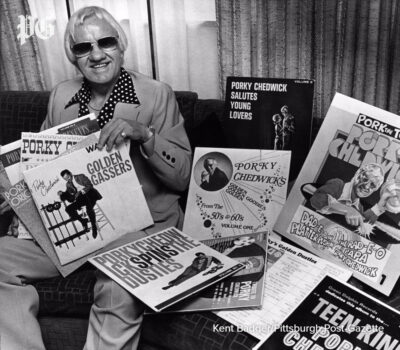
Porky Chedwick’s promotional contributions to the artists and records he loved, photographed in the early-1990s. (Credit: Pittsburgh Post-Gazette)
By the 1980s, the radio landscape had begun to shift. Formats tightened, playlists shrank, and the raw spontaneity that once defined the medium gave way to sterile programming and corporate polish. For Porky Chedwick—whose entire career had been built on instinct, emotion, and rebellion—this new world felt foreign. Eventually, WAMO let him go, a decision that stunned longtime listeners and marked the end of an era.
But Porky wasn’t done. Not even close.
He quickly found a new home at WEDO, a station that welcomed his old-school sensibilities and gave him space to continue spinning the music that mattered. And he didn’t just return—he reimagined himself. Porky co-founded P.O.R.C.C., the Pittsburgh Oldies Record Collectors Club, a grassroots movement that celebrated forgotten vinyl, rare grooves, and the emotional power of nostalgia. It wasn’t just a fan club—it was a community, a sanctuary for those who still believed in the magic of the dusty disc.
Through P.O.R.C.C., Porky helped revive The Marcels, the doo-wop group best known for “Blue Moon,” reconnecting them with audiences and reigniting their legacy. He also launched a new show called “Porkytown,” a joyful blend of music, memories, and storytelling that felt like a living museum of rhythm and blues. It was Porky at his most reflective—still playful, still passionate, but now a steward of history as much as a spinner of hits.
And then came The Linden Grove.
Every week, Porky hosted club dates at the legendary South Hills venue, drawing thousands of fans who came not just to dance, but to pay tribute. The crowds weren’t just nostalgic—they were electric. Young and old, Black and white, longtime listeners and new converts—all gathered to celebrate the man who had never stopped believing in the groove. The Linden Grove became a temple of soul, and Porky its high priest.
His pull never faded. His rhythm never dulled. And his resilience became a lesson in legacy: that true passion doesn’t retire—it reinvents.
Cruisin’ with Porky Chedwick: A Vinyl Time Capsule
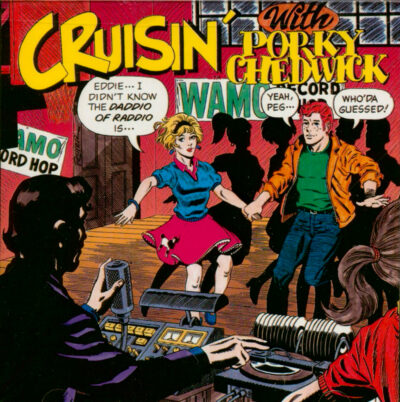 In the early and late 1970s, Increase Records launched a legendary series of compilation albums titled Cruisin’, designed to recreate the golden age of rock and roll radio. Each volume in the series was a sonic time capsule, capturing the spirit of a specific year between 1955 and 1970. But these weren’t just playlists—they were immersive recreations of actual radio broadcasts, complete with vintage jingles, local news snippets, commercials, and most importantly, authentic DJs from the era.
In the early and late 1970s, Increase Records launched a legendary series of compilation albums titled Cruisin’, designed to recreate the golden age of rock and roll radio. Each volume in the series was a sonic time capsule, capturing the spirit of a specific year between 1955 and 1970. But these weren’t just playlists—they were immersive recreations of actual radio broadcasts, complete with vintage jingles, local news snippets, commercials, and most importantly, authentic DJs from the era.
And for Pittsburgh, that meant one voice above all: Porky Chedwick.
The Cruisin’ with Porky Chedwick LP featured Porky as the host, spinning classic tracks and delivering his signature patter with all the charisma and rhythm that made him a legend. The album included timeless cuts like:
• “Whisperin’ Bells” by The Dell-Vikings
• “Love Walked In” by The Flamingos
• “Fannie Mae” by Buster Brown
• “This I Swear” by The Skyliners
• “Blue Moon” by The Marcels
• And Porky’s own intro and theme, bookending the experience
This wasn’t just a compilation—it was a tribute. A celebration of Porky’s role in shaping the sound of a generation, and a way for fans to relive the magic of his broadcasts long after they aired. The Cruisin’ series gave Porky national recognition, placing him alongside other radio giants and preserving his voice for future listeners.
For the USA Radio Museum, this LP is a Porky Chadwick centerpiece—an audio artifact that bridges nostalgia and how radio sounded in the Rock ‘n’ Roll era he masterfully was so much a part of.
Cruisin’ With Porky Chedwick | WAMO | Increase Records
Audio Digitally Remastered by USA Radio Museum
_____________________
A Scare, a Comeback, a Crown
By 1990, Porky Chedwick had already spent more than four decades shaping the soundscape of Pittsburgh and beyond. But that year brought a jarring interruption: a brain tumor diagnosis that threatened not just his health, but the rhythm he had spent a lifetime spinning. For a man whose voice had become a lifeline to so many, the silence was deafening.
Yet Porky was never one to fade quietly.
With the unwavering support of fans, fellow DJs, and music legends, he faced the diagnosis head-on. The community he had nurtured for generations rallied around him—sending letters, organizing tributes, and offering prayers. It wasn’t just admiration. It was love. Porky’s recovery became a shared journey, a testament to the bond between a broadcaster and his audience.
When he returned to AM 860, the station where it all began, it felt like more than a comeback—it felt like a resurrection. His voice, slightly weathered but still electric, once again filled the airwaves with dusty discs and soulful declarations. The groove was back. And so was the man who had never stopped believing in it.
Then came 1996, a year of coronation.
That spring, the Rock and Roll Hall of Fame formally recognized Porky’s pioneering contributions to music history. Though not inducted as a performer, he was honored with a special plaque, acknowledging his role in breaking racial barriers, launching careers, and giving rhythm and blues its rightful place on the radio dial. It was a moment of validation—long overdue, deeply deserved.
But perhaps the most touching tribute came not from an institution, but from the artists and friends whose lives he had changed. That same year, Porky was presented with a custom gold record, inscribed with messages of gratitude and admiration. It wasn’t just symbolic—it was sacred. A token of eternal appreciation from those who knew that without Porky, their songs might never have been heard.
A scare. A comeback. A crown.
Porky Chedwick’s journey through illness and recognition wasn’t just a chapter—it was a crescendo. Proof that soul endures. That legacy lives. And that sometimes, the rhythm returns stronger than ever.
Porkstock at Three Rivers: A Birthday Like No Other
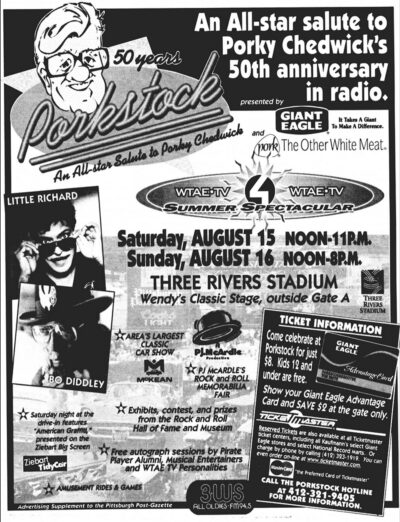 By 1998, Porky Chedwick had spent half a century lifting up voices others ignored. He had spun dusty discs into gold, turned record hops into cultural rituals, and made Pittsburgh swing for generations. So when his 80th birthday approached, the city knew it had to do something big. Something worthy. Something unforgettable.
By 1998, Porky Chedwick had spent half a century lifting up voices others ignored. He had spun dusty discs into gold, turned record hops into cultural rituals, and made Pittsburgh swing for generations. So when his 80th birthday approached, the city knew it had to do something big. Something worthy. Something unforgettable.
They called it Porkstock.
Held at the iconic Three Rivers Stadium, the event was a nod to both Woodstock and Porky’s enduring influence on music culture. But this wasn’t a rock concert. It wasn’t a sports game. It was a celebration of a disc jockey—a man whose voice had become the soundtrack of a city.
What happened next was unprecedented: 50,000 fans filled every single seat in the stadium. It was a complete sellout. Generations of listeners—those who had danced to his dusty discs in the ’50s, ’60s, and ’70s, and those who had inherited the groove—came together to honor the man who had given them rhythm, soul, and memory.
The crowd was a living mosaic of Porky’s reach: Black, white, young, old, musicians, broadcasters, and everyday fans who had grown up with his voice echoing through their kitchens, cars, and hearts. The celebration featured live performances, tributes from artists Porky had championed, and heartfelt speeches from fellow DJs and civic leaders.
The Rock and Roll Hall of Fame presented him with a plaque, though—as Ed Weigle humorously once recalled—Porky looked puzzled by the gesture. “So what the hell else could they give you? A tie?” he quipped, highlighting the irony of honoring a man who had long been overlooked by the very institutions he helped inspire.
But that day, Pittsburgh got it right. The stadium roared not with touchdowns, but with applause. Porkstock wasn’t just a birthday party—it was a coronation. A city saying thank you. A community remembering its rhythm. And a legend finally receiving the love he had spent a lifetime giving—always—in return.
The Spark That Lit Detroit: Robbie D. and Porky’s Ripple Effect
Porky Chedwick didn’t just shape Pittsburgh’s airwaves—he inspired a new generation of broadcasters across the country. One of the most heartfelt examples comes from Detroit’s own Robbie D., who became a beloved voice on WCHB 1440 in the mid-1960s. In a guest essay featured by the USA Radio Museum in September 2025, Robbie shared how Porky’s presence on WAMO shaped his entire path: “From as early as I can remember I had a love for music, especially Black or Black-style music. And jazz was my favorite. I loved Nancy Wilson. While the other kids were outside playing ball, I was sitting in my room listening to jazz, blues, and doo wop. And my favorite radio station was WAMO, Pittsburgh’s R&B station.”
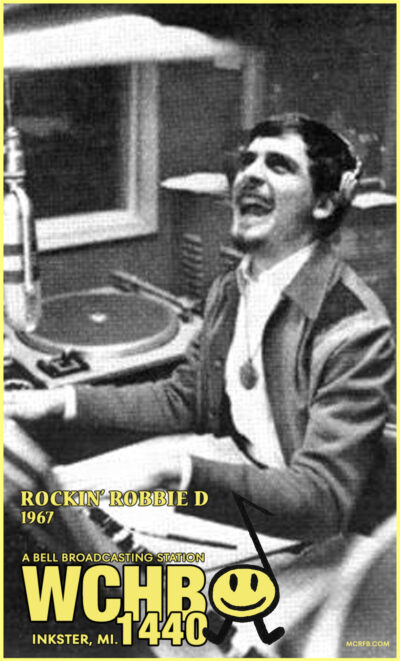 For young Robbie, the dream of working in radio felt distant—until he learned that WAMO’s most popular DJ, the one spinning all that soulful magic, was a white guy named Porky Chedwick: “That dream became a bit more real when I learned that WAMO’s most popular DJ, Porky Chedwick, was a white guy. I figured that if he could do it, so could I.”
For young Robbie, the dream of working in radio felt distant—until he learned that WAMO’s most popular DJ, the one spinning all that soulful magic, was a white guy named Porky Chedwick: “That dream became a bit more real when I learned that WAMO’s most popular DJ, Porky Chedwick, was a white guy. I figured that if he could do it, so could I.”
That realization lit a fire. Robbie began hanging around the station, doing grunt work, soaking up the craft, and eventually earning a chance to speak into the mic—late at night, unpaid, and utterly devoted: “By the time I was in high school, I was on a quest. I aspired to be the ‘Porky Chedwick’ of wherever I ended up.”
And he did. Robbie D. became one of Detroit’s most beloved soul radio voices, known for his charisma, deep musical knowledge, and ability to connect across racial lines—just like Porky had done in Pittsburgh.
This ripple effect—one DJ inspiring another, one city’s sound echoing in another’s soul—is the essence of Porky’s legacy. He didn’t just play records. He planted seeds. And Robbie D. was one of the most vibrant flowers to bloom from that garden.
Honors and Inductions
Though recognition came late, it came strong:
- Inducted into the National Radio Hall of Fame for pioneering the oldies format and championing Black music.
- Honored in the Rock and Roll Hall of Fame’s Cleveland DJ exhibit in 1996.
- Named Pittsburgh’s Favorite DJ by Esquire Magazine in 1965.
- Celebrated by the Pittsburgh Oldies Record Collectors Club (P.O.R.C.C.), inspired by Porky’s legacy.
His custom gold record said it best: “You’ll live forever in the hearts of every artist whose name and music you brought before the public…”
Farewell to the Daddio: A City Mourns, A Nation Remembers
On March 2, 2014, Pittsburgh lost one of its most beloved voices. Craig “Porky” Chedwick, known to generations as the “Daddio of the Raddio” and the “Platter-Pushin’ Papa,” passed away at the age of 96. He died in Brookline, surrounded by family, after being rushed to the hospital in pain. His son, Ben, shared the news: “He was gone.”
But Porky’s legacy was anything but.
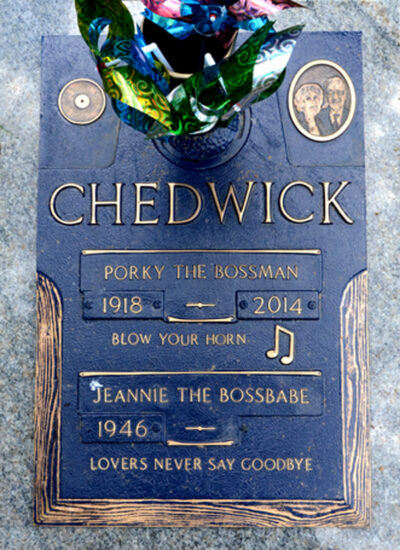 As a young man in the 1940s, Porky wandered into a Homestead record store and began listening to records that couldn’t sell—music intended for Black audiences, buried in bins, ignored by radio. There were no Black stations then. These records lived only in jukeboxes. Porky gave them airplay. He gave them life.
As a young man in the 1940s, Porky wandered into a Homestead record store and began listening to records that couldn’t sell—music intended for Black audiences, buried in bins, ignored by radio. There were no Black stations then. These records lived only in jukeboxes. Porky gave them airplay. He gave them life.
“He said, ‘I’m going to get this music out there if I have to play it on street corners,’” recalled his close friend and biographer Ed Weigle.
And he did. For more than 60 years, Porky brought rhythm and blues to Pittsburgh’s airwaves, becoming one of the first white DJs in America to play Black music in broad daylight. He wasn’t just a local favorite—he was a national influence. Artists credited him with launching their careers. Fans called him a hero. Broadcasters called him a legend.
“Porky was a household name here in Pittsburgh,” said Allegheny County Executive Rich Fitzgerald, “but his impact beyond our city was so much larger.”
He was also one of the first “mobile DJs,” spinning records at community dances and record hops, years before the concept became standard. He founded youth sports leagues to keep kids out of trouble. He hosted oldies nights at the Brookline Pub with his wife, Jean. And even in his final years, he adapted to the times, hosting shows on internet radio and mentoring younger voices.
Radio host Ron Chavis called him “Bigger than Life.” Bev Smith remembered him as a gentle soul who lived through the golden age of personality radio. Bob Haberkost, who worked with Porky at WAMO, said simply: “He was in love with his music—and instrumental in changing the music we know today.”
When news of his passing broke, Pittsburgh’s music community lit up with tributes. WDVE’s Randy Baumann tweeted: “The most important Pittsburgh broadcaster ever.” Joe Grushecky added: “He had a profound influence on Pittsburgh music.”
Porky had been scheduled to appear at a Community Oldies dance just weeks later. Instead, the city mourned. And remembered.
“With Porky Chedwick’s death,” said Bev Smith, “an era is gone that we will probably never get back again—the era of personality radio, the era of commitment to the people. Porky was all of those.”
_____________________
Porky Chedwick | WEDO-AM Pittsburgh| April 8, 1987
Audio Digitally Remastered by USA Radio Museum
_____________________
The Rhythm Lives On
In Loving Memory of Craig “Porky” Chedwick
February 4, 1918 – March 2, 2014
Interred at Jefferson Memorial Cemetery
Pleasant Hills, Allegheny County, Pennsylvania
Garden of the Guardians, Lot 92
He didn’t chase fame. He chased feeling.
He didn’t seek fortune. He sought connection.
And in doing so, he changed radio forever.
From dusty discs to stadium roars, Porky gave soul a voice and Pittsburgh its groove.
His legacy echoes in every B-side rediscovered, every DJ who dares to play what others forgot, and every listener who finds healing in harmony.
The Daddio of the Raddio. The Platter-Pushin’ Papa. The Pioneer of Soul.
Forever remembered. Forever spinning.
_____________________
Contact: jimf.usaradiomuseum@gmail.com
_____________________
A USARM Viewing Tip: On your PC? Mouse/click over each image for expanded views. On your mobile or tablet device? Finger-tap all the above images inside the post and stretch image across your device’s screen for LARGEST digitized view. Then click your brower’s back arrow to return to the featured post.
© 2025 USA Radio Museum. All rights reserved.

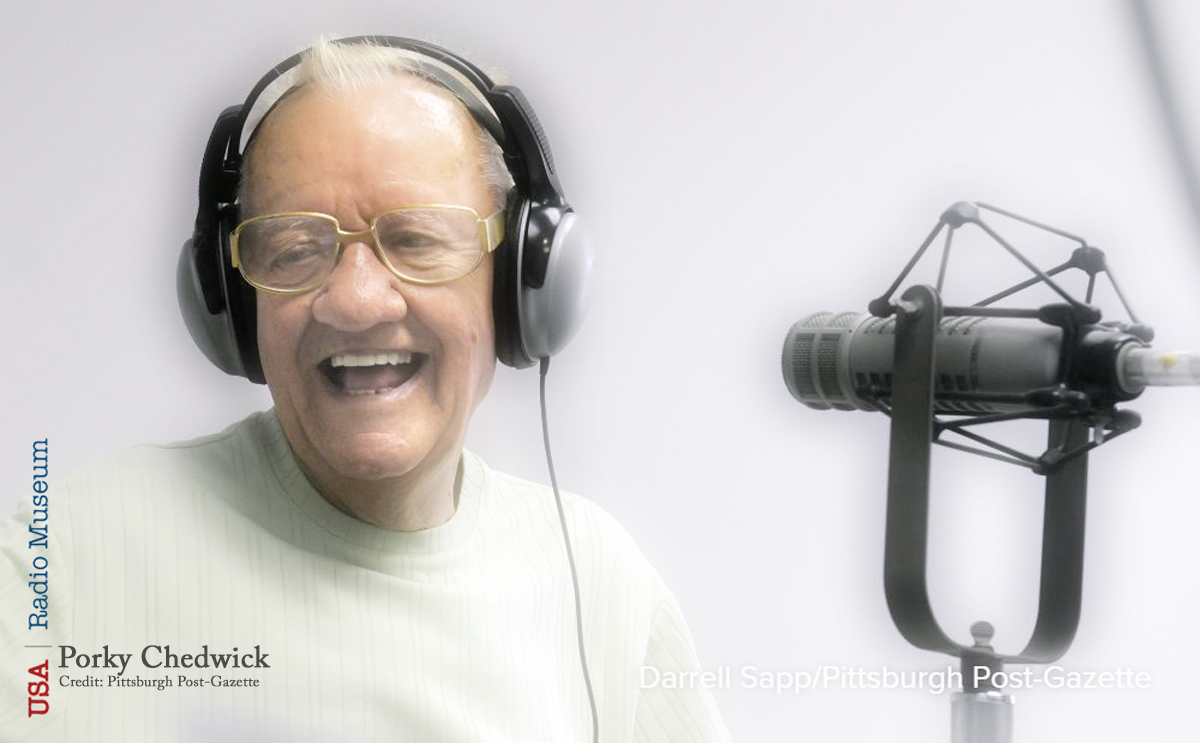
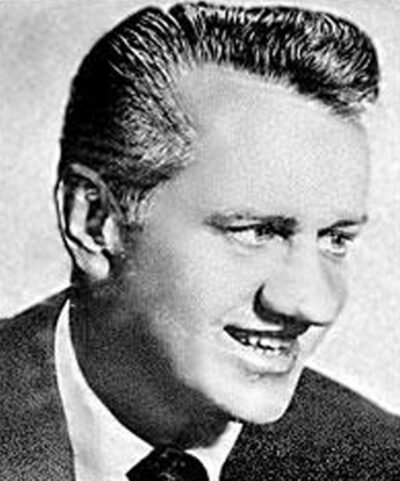
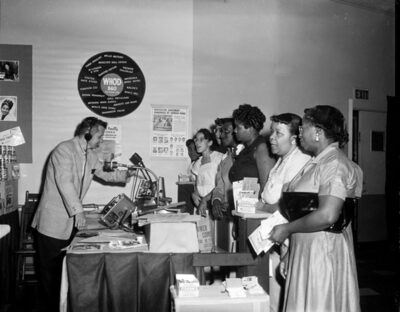
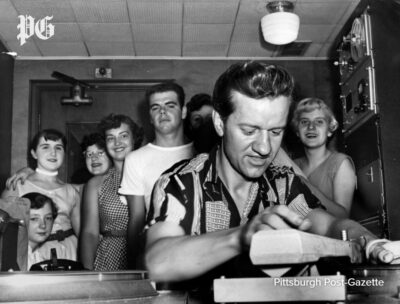
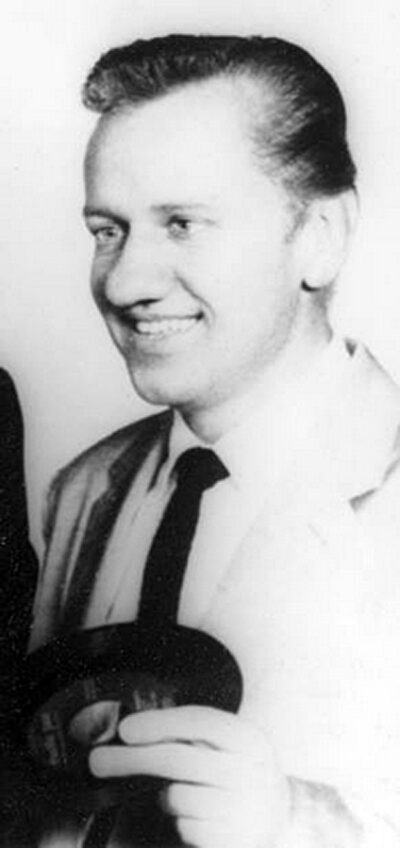
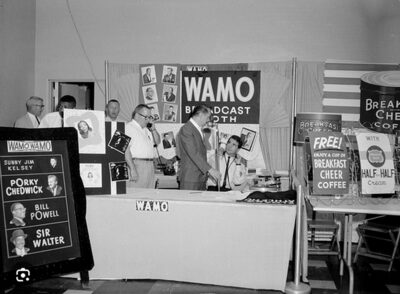
Porky Chedwick Not just paved the way for Robbie D. but also for both Greg Thunder and “Broadway” Bill Lee too as well, and for some way and for many strange type of reasons Eddie O’Jay, “Hollywood” Frankie Crocker, Jocko Henderson, and of course Porky Chedwick permanently and officially gave birth to a new breed of musical genre that would arrive in 1973…………………………Hip-Hop!
Subject: Honoring Porky’s Ripple Effect
Vaughn,
Thank you for your powerful reflection on our Porky Chedwick tribute. Your comment beautifully captures the far-reaching influence of “The Boss Hoss with the Hot Sauce”—not just on Pittsburgh radio, but on the entire cultural landscape that followed.
We wholeheartedly agree:
Porky didn’t just open doors for Robbie D. in Detroit—his fearless programming and soulful mission helped shape the paths of Greg Thunder, “Broadway” Bill Lee, Eddie O’Jay, “Hollywood” Frankie Crocker, and Jocko Henderson.
These voices carried the torch, each adding their own rhythm and resonance to the evolving sound of American soul radio.
Your insight about Porky’s role in laying the groundwork for Hip-Hop is especially compelling.
While the genre officially emerged in 1973, Porky’s early championing of Black music, streetwise storytelling, and rhythmic innovation created fertile ground for what was to come. In many ways, his “dusty discs” and defiant playlists were proto-Hip-Hop—raw, real, and rooted in community.
We’re grateful for your perspective and would love to explore this lineage further in future museum features. Porky’s legacy is still unfolding, and voices like yours help us tell the full story.
With appreciation,
Jim Feliciano
USA Radio Museum
Preserving the Soundtrack of Our Lives
Right back at ya Jim. 😉
That is an excellent biography of Porky. He had a big influence on Pittsburgh radio and on other white broadcasters who promoted black music, Robbie D in Detroit included. (As a resident of the Detroit area in the 60’s and 70s I was aware of WCHB but not of Robbie D.) I do not understand Porky’s motivation to become a DJ promoting black performers, however. Something is missing in the biography to explain this phenomenon.
Subject: Thank You for Your Thoughtful Reflections on Porky
Dear Jim,
Thank you for your kind words and for taking the time to share your reflections on our Porky Chedwick tribute. We’re honored that the piece resonated with you, and your perspective as a Detroit-area listener during the golden age of soul radio adds meaningful depth to the conversation.
You raise an excellent point about Porky’s motivation—one that deserves more exploration. While the article focused on his impact and legacy, the emotional and cultural roots of his mission are just as vital.
Porky grew up in Homestead, Pennsylvania, in a working-class neighborhood where poverty blurred racial lines. Music was the common language. As a young boy, he gravitated toward gospel, blues, and rhythm and blues—not because it was popular, but because it was truthful.
He once said, “I was mainly looking for the gospel sound and down-home rhythm and blues—the songs which spoke of the problems of poor people. That was my music.” His empathy ran deep, and his turntable became a tool to elevate the sound throughout his life.
When he entered radio in the late 1940s, Porky deliberately sought out “race records” that mainstream stations ignored. He dusted them off—literally—and gave them airtime. He wasn’t chasing trends or fame; he was amplifying voices that spoke to the soul. That conviction made him a pioneer, and it inspired others like Robbie D in Detroit to follow suit.
We’re grateful for your insight and would love to expand future features to include more of Porky’s personal journey and emotional motivations. Your comment helps us do just that.
Warm regards,
Jim Feliciano
USA Radio Museum
Preserving the Soundtrack of Our Lives
5-STARS +++
This piece/work is like a complete one-stop compendium on “everything Porky” – “Get it, and get it All” !!!
It is obvious that a huge amount of homework and research was done to compile this wonderfully written and thorough/complete Profile and History on Porky – THANK YOU FOR HONORING PORKY IN SUCH A BEAUTIFUL AND ACCURATE WAY, WHICH IS WELL DESERVED BY “THE BOSS HOSS WITH THE HOT SAUCE, YOUR PLATTER PUSHIN’ PAPA, PORKY” !!!
Subject: Thank You for Celebrating Porky With Us
Dear JT Wilks,
Your message lit up our day—thank you for the kind words and the 5-star praise! We’re deeply grateful that “The Rhythm That Changed Radio: Porky Chedwick’s Soulful Mission to Make Black Music Heard” resonated so strongly with you.
Porky was more than a DJ—he was a cultural force, a fearless advocate, and a soul ambassador who gave voice to the unheard. To hear that our tribute felt like a “one-stop compendium on everything Porky” is the highest compliment we could receive. We poured our hearts into honoring “The Boss Hoss with the Hot Sauce, Your Platter Pushin’ Papa,” and your response tells us we got it right.
Thank you for joining us in keeping Porky’s legacy alive. His dusty discs still echo, and his mission still matters to so many, today. We’re proud to share this history with passionate readers like you.
With gratitude,
Jim Feliciano
USA Radio Museum
Preserving the Soundtrack of Our Lives
Thank you, Jim –
Your USA Radio Museum is new to me, and a fantastic resource – and I actually learned about it from “Rockin’ Robbie D” himself (JPaul), who was a High School classmate of my younger sister in Pittsburgh . . . which is how I came to know him.
I grew up with Porky on the Radio in the late 50’s and early 60’s, where I got my “musical education” about “Black Rhythm & Blues” and so called “Race Music” at the time – which he sometimes referred to as the “Brown Sounds” – and Porky always stood out as a special, “magnetic”, and very individualistic DJ and Radio Personality. To my knowledge, the only other Radio Station out there that was broadcasting a similar format as Porky at the time was WLAC in Nashville (“John R” and “Hoss” Allen), which I would listen to at night when Porky wasn’t on – because WLAC had a 50,000-Watt Clear Channel signal that came through very well in Pittsburgh, Pennsylvania at night (and elsewhere around the Country) . . . all the way from Nashville.
It’s great that you and your colleagues there at the USA Radio Museum are so faithfully and diligently recording / memorializing / archiving / preserving the History of this great “Medium of Radio” – perhaps the Smithsonian Institute should create a special “Radio History” category featuring your “USA Radio Museum” platform/work . . . if it hasn’t already.
https://www.google.com/search?q=Smithsonian+Institute+%22Radio+History%22+category&rlz=1C1CHBD_en-GBUS1176US1176&oq=Smithsonian+Institute++%22Radio+History%22+category&gs_lcrp=EgZjaHJvbWUyBggAEEUYOTIHCAEQIRigATIHCAIQIRigATIHCAMQIRigATIHCAQQIRigATIHCAUQIRigAdIBCjEyMDUxajBqMTWoAgCwAgA&sourceid=chrome&ie=UTF-8
With great admiration and respect for your work / JT Wilks (Philly area)